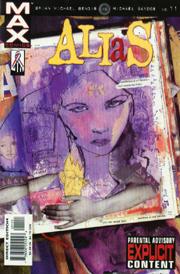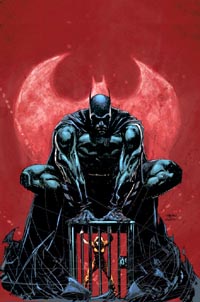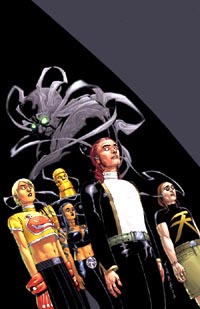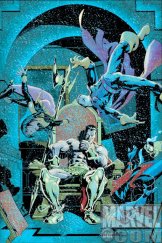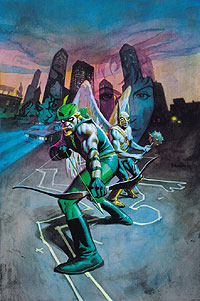|
Each week we take a critical look at some of the best books on the stands, courtesy of Big Guy's Comics (the unofficial comic book store of FanboyPlanet.com). If you publish a book that you want us to be covering, contact us. Or contact Derek. He doesn't have enough to do.
Hey Kids! Comics!
Alias #11
Rebecca, Please Come Home, part 1
writer: Brian Michael Bendis
artist: Michael GaydosBendis takes Jessica out of the city, into a small town where even the notion of a private investigator ends up being uncomfortably public. Everybody knows everybody's business in Lago, New York, except that nobody seems to know what happened to Rebecca Cross.
We actually get to see detective work being done; while it's always been an element of the book, it's rare for it to take the forefront. Early on it becomes clear that Lago is a town that doesn't really know how to handle super-powered people, but Jessica stands out more for her tendency to swear than for her previous identities as Jewel and Knightress.
Quickly, she uncovers the kind of small-town ugliness we've come to expect, but Bendis manages to keep it from becoming cliched. In tandem with Gaydos, he manages to create a lot of depth in the people of Lago, though the sheriff looks amazingly like Luke Wilson. There's one creative shortcut to characterization right there.
But Gaydos doesn't take the easy way out with his art elsewhere. The people's facial expressions don't always quite match what they're saying, making this one of the most well-acted comics in quite some time. He also experiments with white space in such a way that it never looks lazy; it really adds to the suspense and mood.
As always, no matter where Jessica is, she makes for a good story.
Rating:

CrossGen Chronicles #8
writer: Mark Waid
artists: Esteban Maroto and Pablo Marcos
reviewed by: Charlie WentlingThe characters of Capricia and Danik from Crux are explored in this tale that takes place in the Atlantis of the distant past. The mission of the Atlanteans was to shepherd the human race to a grand destiny. The two learn from the scholar Amatus about the best ways to guide humanity. After hearing so much about their mission, it is nice to finally see it illustrated and to see some of the tough decisions that they have to make.
As will be familiar to readers of Crux, Danik and Capricia have contrasting philosophies. Capricia has the more compassionate view and wants to be more involved with humanity, while Danik thinks that humanity will be better off by learning hard lessons and not being completely shielded from the real world. Waid does a good job of showing both points of view without making either of them the "right" one.
Much of the action results from Amatus deciding to start his own colony of humans, and what Capricia and Danik decide to do about it. We finally begin to understand why Danik acts the way he does.
This is the final issue of CrossGen Chronicles (and Waid's swansong on Crux). In the letter column, it is explained that future stories about the history of the CrossGen universe will take place in miniseries or one-shot issues. The first of these will be Lawbringer, a spin-off from Negation that will appear in October.
Rating:

Detective Comics #772
Principle
writer: Greg Rucka
artists: Sergio Cariello and John NybergNot just remembering Sasha, this issue shifts all its focus on Bruce Wayne's erstwhile bodyguard. Apparently somewhere between issues her trial happened at lightning pace, and for her silence Sasha has been rewarded with life in prison without possibility of parole.
It gets impossible to buy into Batman's initial decision when this sort of consequence gets revealed. Never mind that Bruce Wayne's innocence was in doubt (no, really) for a few issues; Sasha was obviously innocent. And Batman has let her suffer for keeping his secret.
Rucka tries to dig around that, with a heartening speech from Alfred before Sasha can give in and betray what she really knows. But as driven as Batman is, the impetus for this crossover has hinged upon him acting not just out of character, but insanely so.
Then again, that's probably the key right there.
At any rate, the art team does a good job resembling Steve Lieber, keeping the steadiness of this book's look in place. And in the back, Winick and Chiang wrap up Josie Mac with a satisfying resolution to their mystery, and an end wide open for a return visit with the psychic cop. I'd buy it.
Rating:

Doom Patrol #10
Asphalt And Good Intentions
writer: John Arcudi
artist: Tan Eng HuatRobotman has made peace with Jost, and all lawsuits against the Doom Patrol have been dropped. While they're not quite on the billionaire's payroll, they still have a vague alliance; at least enough for Jost to criticize the Q-rating of the newer members.
Just as Cliff and Negative Man ponder the consequences of that, Amazo shows up to make trouble. This being the Doom Patrol, of course, the team never manages to confront the super-android, instead getting sidetracked by a far weirder (and lower profile) menace.
Then things really go to hell.
Now that everything has been sorted out as to who's really who, the book can start capturing the vibe that the best Doom Patrol stories have always had. Arcudi has set up an appropriately disturbing villain (who has been popping up in previous issues), and the team has reached a believably uneasy peace with each other. Now they can relax and be weirdness magnets instead of being the weirdness themselves. (Well, they are weird, but…you get the point.)
Huat's art is serviceable, though he overuses some tilted panel effects. Several pages blur into each other, and when interrupted by this month's Playstation 2 Space Race ad, it appears that the Looney Tunes have invaded the book. Worse, it's starting to look like an excuse not to draw backgrounds. This issue is not Huat's finest hour.
Rating:

Exiles #15
I Cover The Waterfront
writer: Judd Winick
artists: Jon Holdredge, Norm Rapmund, and Tim TownsendOf all the adventures the Exiles have had so far, this may be the first in which we've seen very little difference in the character of the alternate universe from the Marvel Universe we're used to. This Namor, poised to take over the world through Latveria, certainly seems just a slightly older version of the one first re-introduced in Fantastic Four. Without, perhaps, the tempering attraction for Susan Storm, complete annihilation of the surface world makes sense.
And though this Doom wears a mask that reveals more of his seared flesh than we may be used to seeing, he's still a villain. Even when in need of this multi-dimensional super-team, he still plans Machiavellian schemes, letting them know only what he deems necessary. As is usually the case with Doom, his arrogance could prove fatal for his allies.
Winick creates this only slightly different world to make a blunt point about superheroes in general, and to explore The Mimic's psyche further. Seeing all these alternate (and to his mind, wrong) versions of people Calvin once called friends may be pushing him to the edge. If The Mimic does lose it, it won't be without warning to the readers, and it's worked into the story so skillfully, it doesn't seem like forced melodrama.
The art team provides some great layouts, keeping their splash pages to a minimum. And still the action builds beautifully. For some reason, I keep expecting this book to not be great (lots and lots of old prejudices, I guess), and instead, it always ends up being one of my favorite reads.
Rating:

The Filth #2
writer: Grant Morrison, artists: Chris Weston and Gary ErskineRight now, this book pretty much defies description, but because it's my nature, I'm going to try.
A super-secret organization known as The Hand resides in a secret headquarters called The Crack, where Agent Slade has been called back from an alternate/false/imaginary existence as Greg Feely. Trouble is brewing, as one of The Hand's best agents (the only one better than Slade) has gone rogue, setting in motion events that could overrun the world with nanobeings.
Evidently, this sort of thing has happened before, or maybe such a chronological reference has no meaning in The Crack. Somehow, orgies, intelligent dolphins, and a socialist chimpanzee assassin have their place, too.
Like Morrison's The Invisibles, this book is getting off to a rollicking start, daring the reader to keep up. And yet somehow it seems a little easier to keep straight. Maybe forewarned is forearmed; knowing that Morrison is really more interested in cool concepts than actual plot makes it easier to swallow.
And he has great collaborators with Weston and Erskine. Their art matches the complexity of the story. A little reminiscent of Phil Jimenez (who did one of the best arcs of The Invisibles), the layouts are rich in detail, and warrant going over a couple of times just to try to catch everything.
Okay. After swearing to myself I wouldn't be, I'm hooked.
Rating:

Hawkman #5
Slings And Arrows, part one
writer: Geoff Johns and James Robinson
artists: Rags Morales and Michael BairYou know, when you're having woman-trouble, the last person you should turn to for advice is Oliver Queen, a.k.a. Green Arrow. And yet somehow, Johns makes it plausible that Hawkman and the Emerald Archer end up commiserating. Better yet, Queen's words of advice sting and ring true. Carter Hall isn't in love with Kendra; he's obsessed. Who else would dare say that to his face?
But that's just the mushy part of this book's plot. For action, there's a killer stalking the streets of St. Roch, dressed as Green Arrow. In the superhero comic tradition, Hawkman at first mistakes the real Green Arrow for the killer, and the two must fight.
Though they reach an uneasy peace (traditionally, the two have never really liked each other), it doesn't help that Hawkgirl doesn't like Ollie, either, though for different reasons. Girls talk after all, though you wouldn't think hawks and canaries would have that much in common.
If you needed proof that people other than Kevin Smith could write an interesting and fun Green Arrow, this issue offers it in spades. And of course, Morales and Baird draw a mean battling bowman, too.
Finally, the villain behind it all is one of those slap your head moments that still could only have come from Robinson and Johns. From start to finish, this book rocks.
Rating:


All comics were reviewed by Derek McCaw unless otherwise noted.













